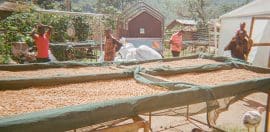The pandemic we have to have

2 June 2020 at 8:30 pm
The old corporate models that focus on profit maximisation have had their day, writes Antony McMullen, who points to cooperatives as the key to building economic democracy and an “epidemic of belonging”.
The current coronavirus pandemic poses a frightening health risk, the parameters of which are still nebulous and unknowable. And we are already seeing the associated costs to global and national economies; to communities and to individuals. The crisis has and will touch even those of us who avoid infection. None of us are immune. Politicians are resisting the term “recession”, but commentators agree on its imminence: the urgency with which we need to reform our economy and business structures is clear.
The old corporate models that focus on profit maximisation or those based solely on centralised state coordination, have had their day. Environmental limits have been breached, as has been tragically illustrated by unprecedented bushfires, and now the coronavirus. Our political class appears incapable of meeting the social and economic challenges associated with this. We will only have better government if our communities experience grassroots democracy; including in our working lives. Otherwise we will always leave things up to “them” rather than taking responsibility for “us”.
The alternative to reviving democracy in our Commonwealth is frightening. Pew Research has found that nearly 20 per cent of Australians surveyed think that the answer to our problems is a strong leader unconstrained by parliament or the courts. In our economically stranded rural and regional communities the siren call of extreme politics is becoming almost irresistible. The jobs left long ago, and now things will be worse. The way out of this crisis isn’t to find our own version of presidents Trump or Bolsonaro (at least our politicians are a lot better than that). We need a model that better shares wealth, opportunity and decision-making at the local community level.
How can we get there? When building economic democracy, we thankfully don’t have to start from scratch, as the model has been hiding in plain sight – 80 per cent of Australians are members of cooperative or mutual member-owned enterprises. Cooperatives employ more people globally than multinationals combined. These jointly owned, democratic enterprises exist to bring social, economic and cultural benefit to their members, and can both relocalise and revitalise economically moribund communities. Cooperatives bring people together. Our politicians agree, as illustrated by the landmark Cooperative, Mutual and Member-Owned Firms Senate Inquiry of 2015, which remarkably enjoyed multi-party support.
There are some inspiring international examples of cooperative economic development to draw from. Mondragon in the Basque region of Spain has a population of little more than 22,000 people and yet it birthed the Mondragon Cooperative Corporation that features 260 employee-owned enterprises (everything from large-scale manufacturing through to supermarkets) with annual revenues in excess of $20 billion (and it is the fourth largest employer in Spain).
The Mondragon model has in turn inspired other similar place-based models of economic development. As a response to a massive pull-out by corporations, the Cleveland Model in Ohio USA features a community wealth building network that includes a large commercial worker-owned hospital laundry, solar power installation, and hydroponic greenhouse enterprises that all provide secure employment, co-ownership and profit-share for their workforces.
Similar challenges were faced by Preston in Lancashire (UK). They had been battered by the global financial crisis and the UK’s economic austerity response, as well as a loss of significant private investment and the failure of a massive shopping centre plan. There seemed little hope for renewal. However, since 2013 the community wealth building approach employed under the Preston Model has benefited the community by increasing local spend by more than $138 million while creating 4,000 living wage jobs to help working families thrive. This has been achieved by local “anchor institutions”, such as local hospitals, educational bodies and local government, all committing to socially procuring goods and services by locally-owned enterprises and employee-owned cooperatives.
Closer to home in Victoria, the Earthworker Cooperative has established two ground-breaking employee owned cooperatives as part of its own common wealth building network. Based in the Latrobe Valley, Earthworker Energy focuses on distributing quality solar hot water (our one at home is still saving us money five years down the track) as well as energy storage products to households while creating livelihoods for employee-owners. Redgum Cleaning Cooperative started business in February 2018 but already has a growing and satisfied client-base earning it the Employee Ownership Australia SME prize in 2018. The cooperative provides dependable work in an industry not known for its good conditions. Because of the community spirit engendered by the nature of this enterprise, many Redgum clients are still paying for domestic cleaning that has been put on temporary hold due to the pandemic.
In a similar vein, and at the forefront of innovation, is the first Australian “platform cooperative”, soon to be launched by the Bendigo-based cooperative bHive. bHive has big plans to facilitate development of locally-owned cooperative enterprises that will provide access to local goods and services, create meaningful work, relocalise spending, create community connection and look after the environment.
The centrepiece of bHive’s project are the “Villages” – online platforms to connect groups of neighbours together to build social capital by facilitating the sharing of free resources and skills already present in the local community. Villages aim, in the words of bHive, “to create an epidemic of belonging”. This is the civil society core of cooperative business. Once proven in Bendigo, the bHive model will be replicated in other Australian regions. Next is a driver-owned platform to rival Uber. Like all the models outlined these initiatives will be networked cooperatively to ensure the ongoing integration and integrity, viability and equitable sharing of the community wealth generated.
To provide hope for communities seeking a future of shared prosperity I hope that this “epidemic of belonging” will become a pandemic. Communities taking control of their own destiny requires coordinated local ownership so that all can share prosperity. Build it and the political class will come. Don’t build it and the political entrepreneurs will enrich themselves at the expense of already vulnerable communities.
About the author: Antony McMullen is committed to developing cooperatives to create social impact for the common good. He is a co-op founder, director and developer. You can find him on @antonymcmullen and LinkedIn.







